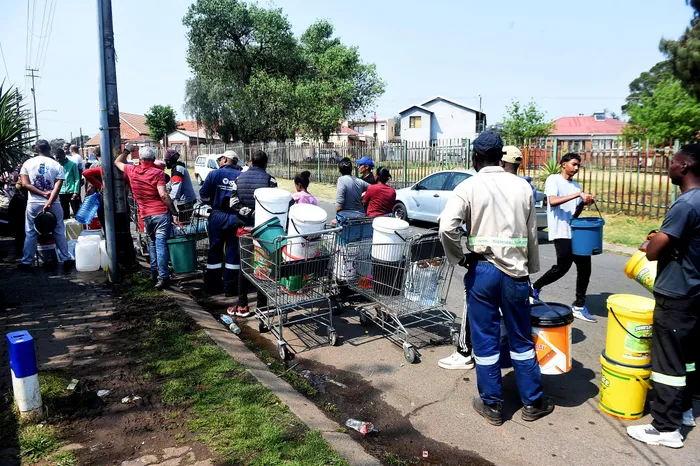
Johannesburg's water crisis deepens as residents face daily struggles
Image: Itumeleng English / Independent Newspapers
Water shortages continue to worsen across Johannesburg, with residents facing daily hardships amid ageing infrastructure, illegal connections, and high non-payment rates.
Jo’burg Water has acknowledged these problems but assures the public that supply to critical areas — including venues for the upcoming G20 Summit — will remain stable, with water tankers on standby.
The crisis particularly affects many townships and informal settlements such as Coronationville, Westbury, and Zandspruit, where residents rely almost entirely on Jo’burg Water.
Yet, access to clean water has become an ongoing challenge, prompting protests from communities frustrated with what they say is a lack of meaningful action from authorities.
“The situation here is dire. We’ve been struggling with water shortages for over seven years, but the city hasn’t done anything,” lamented Joseph Makhanda, 43, from Coronationville.
“We can’t do basic things because there’s no water. They know about the problem but are doing nothing.”
Margret Samuels, 35, also voiced frustration, pointing out that protests are the only way to gain attention.
“Almost all residents have to protest first before anything happens. After a day’s work, it’s hard to come home and find no water—it makes daily life so difficult.”
Johannesburg Mayor Dada Morero has admitted that the city’s initial response to restoring the water supply in Coronationville and nearby areas failed.
After a water outage began on September 11, the city committed to restoring supply within seven days, but that deadline passed without results.
Morero further promised a new intervention starting on 22 September.
In the meantime, Jo’burg Water said it deployed 21 water tankers for emergency relief in Coronationville, Newclare, Westbury, and surrounding suburbs, but residents say this aid is insufficient.
“We still have no water. We fetch it from faraway places. Tankers don’t come to every street, and we don’t know if the water is even clean,” said one Coronationville resident.
Jo’burg Water spokesperson Nombuso Shabalala explained the root causes of the crisis.
“The Commando System supplies a large area of Johannesburg, including essential institutions such as Rahima Moosa and Helen Joseph Hospitals, clinics, schools, the University of Johannesburg, JMPD Headquarters, and SABC. This system also serves Coronationville and Westbury.”
She said the key factors leading to shortages are demand exceeding supply, ageing and leaking infrastructure, high non-payment rates resulting in wastage, and infrastructure tampering through illegal connections that cause damage.
“Jo’burg Water recognised the need to rehabilitate the Commando System over ten years ago, but funding delays stalled progress. We are now investing R800 million on this priority infrastructure project,” Shabalala said.
“This includes the New Crosby Bulk Infrastructure project (pump station), Brixton Reservoir and Tower, Crosby reconfiguration, and renewal of the Hurst Hill 1 and 2 reservoirs.”
Shabalala stressed these projects started without the need for resident protests.
Other areas, such as Zandspruit informal settlement, also face severe shortages. Resident Kagiso Machaka described the daily struggle as frustrating.
“The taps run dry during the day. We wake up at night to get water, but it’s unsafe because crime is high. Water tankers don’t come every day, and sometimes we don’t get water because there are too many of us. The city isn’t helping enough, but come election time, they’ll be here looking for votes.”
Shabalala said Jo’burg Water faces further operational pressures, including insufficient bulk infrastructure, leak-related physical losses, and persistent illegal connections.
“High water demand, non-payment, and wastage are major challenges,” she said.
Despite the crisis, she said, “Johannesburg Water has no planned water supply disruptions two weeks before and during the G20 Summit.”
She added that if needed, water tankers will remain on standby at summit venues and hotels.
However, activists remain sceptical about the city’s ability to solve the crisis in the short term. A coalition called the Johannesburg Crisis Alliance—which includes the Ahmed Kathrada Foundation, OUTA, WaterCan, and Defend Our Democracy—has called for urgent action.
Dr Ferrial Adam, Executive Manager at WaterCan, told IOL that the crisis is deep and unlikely to be resolved by the time of the G20.
“They might manage water trucks for the event, but a long-term fix will take much longer. The government might ensure summit areas get water, but most residents will still face shortages for the summer.”
Adam emphasised the importance of releasing funds for infrastructure projects.
“The city must provide Johannesburg Water with the budgeted money to continue work. Completing the Brixton reservoir, installing new pump stations, and fixing the Hurst Hill reservoir are crucial.”
She criticised Mayor Morero’s repeated promises and shifting deadlines.
“He keeps making empty promises—first seven days, then three weeks. That raises people’s hopes and leads to disappointment. Citizens would respect honesty about the scale of the problem and a realistic timeframe.”
“The mayor focuses on Coronationville, but other places like Westbury are still struggling. It’s inaccurate to say everything will be fine after one pipe is fixed.”
thabo.makwakwa@inl.co.za
IOL Politics
Related Topics: